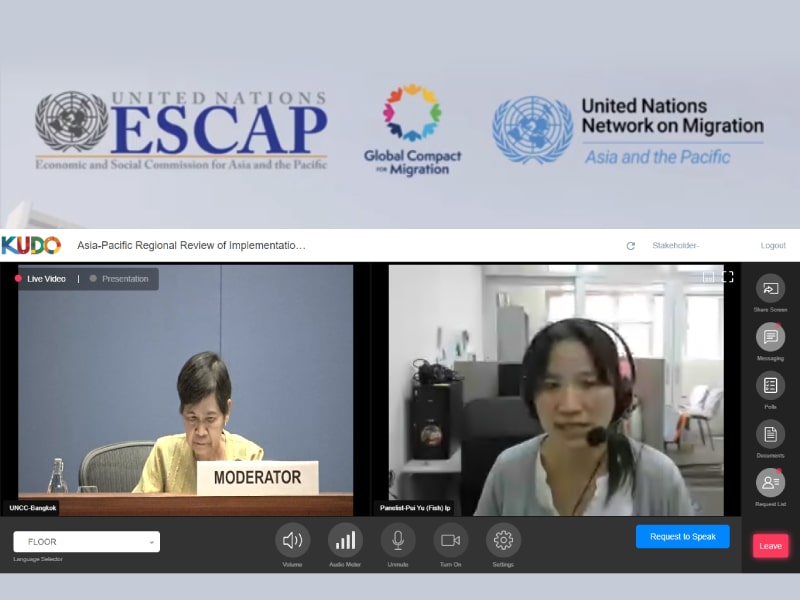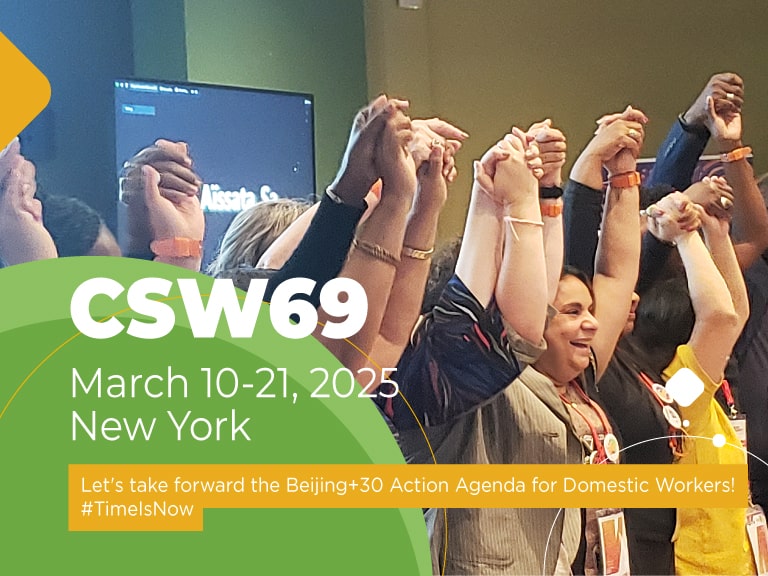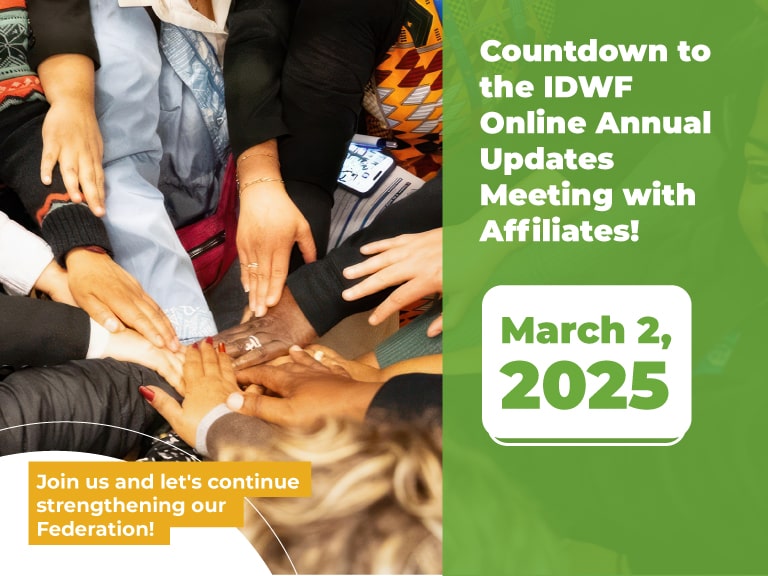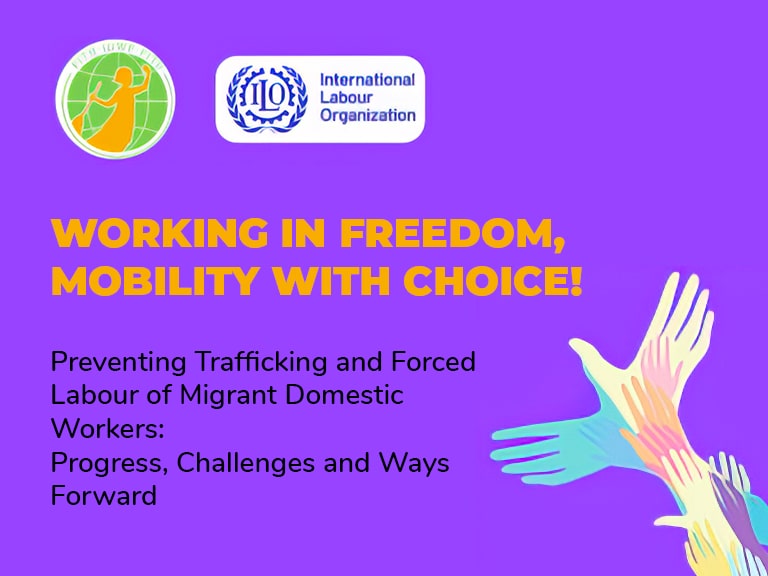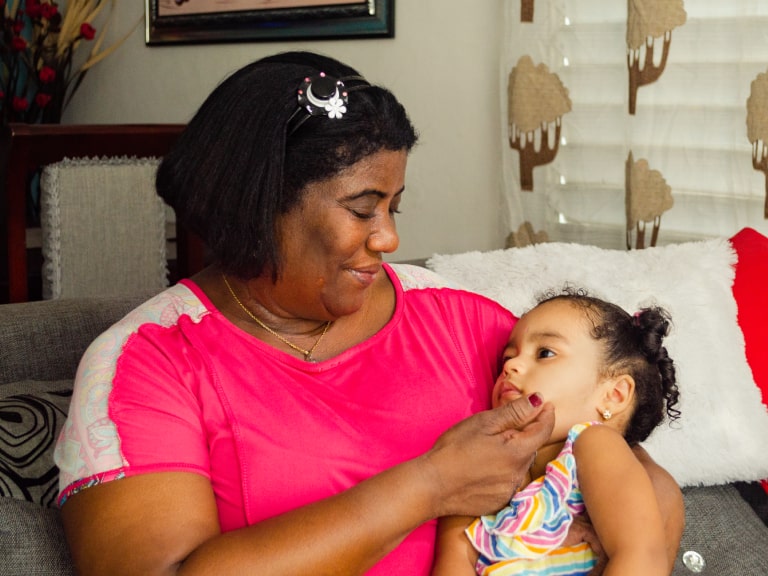- This event has passed.
Asia Pacific GCM review: Migrant domestic workers organizing is leading to changes, claim Fish Ip of IDWF
On the second day of the Asia-Pacific Regional Review of Implementation of the Global Compact for Safe, Orderly and Regular Migration, Fish Ip, the IDWF Asia regional coordinator, spoke at the first Roundtable on “Ensuring that migration is voluntary, regular, safe and orderly (addressing objectives 2, 5, 6, 12 and 18 of the Global Compact)”, co-organized by ILO, UNESCO and UNFCCC. She describes how organizing of migrant domestic workers is leading to changes bit by bit.
Details

Ms Boonpala from the ILO, Ms Samantarah from the Ministry of Labour of Thailand, Irene, Ms Swati, and distinguished delegates and guests of the GCM, good morning, and good afternoon for those in the Pacific,
Thanks to the organizer and the ILO for the meeting inviting the IDWF to share our experience.
We have indeed too much overwhelmed during the COVID19 pandemic. When the pandemic began, our domestic workers’ leaders from every part of the world get many messages and calls for help. Imagine you get 300 messages in one day – all for urgent help! And many of the domestic workers leaders are still working at their employers’ homes and try to find a way to reply and help, and sometimes the leaders being blamed when the workers cannot get immediate replies or help – we understand that. This is because they are stressful and left helpless. It is indeed a very, very stressful time.
Yes, there are problems during the COVID19 pandemic, but the problems, challenges, and domestic workers’ issues have always been there. The pandemic has exposed the seriousness of legal and policy gaps in protecting domestic workers and migrants’ rights. The pandemic has revealed how deep the vulnerability of these workers is. The workers suffer the calamity of the pandemic, but it’s more the calamity of the lack of rights.
Again, dear friends. Not maids and servants but ‘domestic workers’ is the proper term, as used in the ILO standards. The use of terms can lead to a positive mindset and cultural shifts. The government can first take the lead in this. Labour laws should be inclusive – no one should be left behind. Domestic workers are workers and should be included in your labour laws. We notice that a few Asian governments have been taking initiatives to change the terms and doing labour law reform like Nepal, which has included domestic workers as workers. Malaysia has changed the term from servants into domestic employees, but we need inclusion of labour rights – the same as other kinds of workers.
The case of Ms Piang, a Burmese migrant domestic worker in Singapore who died in 2016 from abuse by her employers, can only get justice from the court only recently, after five years. She weighed 24 kg when she died. With the hearing of her death, the government recently announced that they are considering real mandatory day-offs for migrant domestic workers. Day-offs are not only for rests, basic human rights, it allows them to make friends, and we can train them to know their rights. Access to information and communication like access to phones allows them to seek help when they are abused. However, most employers do not give day-offs to domestic workers in Asia, as this is not a legal right in most Asian countries. Working in private households make them more vulnerable to human rights and labour abuses, gender-based violence. Excessive agency fees that put workers into debt bondage have barred workers from escaping from abuses and seeking help. Immigration rules with visa restrictions and tying to employers often undermine the labour rights migrants are supposed to have.
On top of heightened xenophobia and racial discrimination, MDWs got limited access to personal security equipment, often no access to COVID19 tests and vaccines.
However, the workers have been organized no matter how difficult the situation is. The leaders who receive hundreds of calls and messages I mentioned are committed to making changes out of the deplorable situation. Being migrants, your fellow migrants are your only family in this second home in the foreign land. We must make space and allow them to be organized and recognize their own organizations to have a voice in society.
Although it’s hard, as not all migrants have day-offs, domestic workers have managed to be organized. The IDWF, with the support of the ILO Safe and Fair project, started to organize Indonesian migrant domestic workers in Malaysia in 2019. Last year, the PERTMIG, the first Indonesian migrant domestic workers organization, is formed. It has now 96 members with very committed leaders. During the pandemic, PERTIMIG and AMMPO, our affiliate in Malaysia organizing Filipino migrant domestic workers with 315 members, has done relief work to the fellow migrants. Despite the lockdown, theses leaders are grounded in the community. The organizations have focal points from the leaders themselves. Through the networks with the NGOs and trade unions, and individuals, the domestic workers leaders can reach out to thousands of migrant workers in distress during the pandemic and in deep need of help. Some women migrants are pregnant or with a newborn baby but left with no money due to the pandemic. The migrant domestic workers reached out to them and offered immediate help.
The workers’ situation would not have been like this if the governments would have provided necessary social security and include support in health and relief to the migrants regardless of their status.
Due to the prompt help and reach out to workers, the organizations have increased their membership and known by more migrants, and finally, we can get recognized by the governments.
In December last year, IDWF was able to organize the first social dialogue, “Inclusive Labor Law Reform: Migrants and Domestic Workers Have the Rights Too!”, with the Ministry of Manpower of Malaysia, the embassies of the Philippines and Indonesia, trade unions and NGO partners and the migrant domestic workers leaders from AMMPO and PERTIMIG for the first time ever lead the discussion and get well recognized. We can see we are moving for more collaboration, not only the long-time NGO partners but also now the trade unions, the embassies and the governments of destination.
Our Filipino migrant domestic workers have done a few times in Hong Kong and Malaysia to organize Post-arrival training with the Philippines embassy. The migrant domestic workers being new arrivals, can get the first-hand experience from the workers. These are very helpful, but we hope we can continue this good practice and also in more countries.
Our new affiliate from Taiwan, the Domestic Careworkers Union, DCU, has a direct hiring campaign starting 2019. Through direct hiring, the migrant domestic workers can get rid of the excessive agency fee, and these workers instead contribute more membership fee to support the union.
Organizing migrant domestic workers is our focus area of work in IDWF. We have now migrant domestic workers organized in Hong Kong, Macau, Singapore, Malaysia, Taiwan, Kuwait, Qatar, Jordan, Thailand, India and formed their organizations. But only two are registered trade unions (Hong Kong and Taiwan). Our affiliates and groups are still very small. We have to work hard. For that, we desperately need your support – the government to open space for social dialogues with the migrants, to discuss together how we can have labour laws accepting migrant and domestic workers rights.
Following up on the GCM, we will continue to engage in a follow-up process leading up to the International migration review forum.
Thank you very much.
